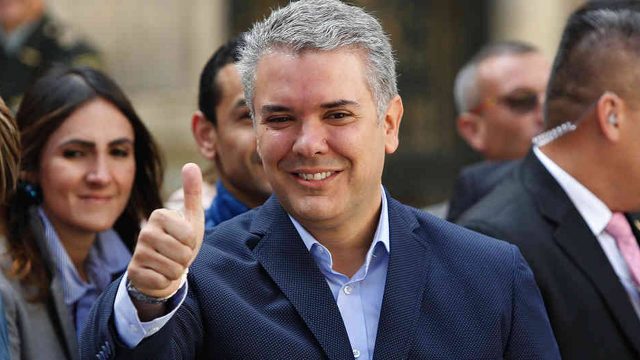After more than two weeks of massive demonstrations in Colombia, the «space» for dialogue proposed by President Iván Duque has not yet been installed. The ‘talks’ between the two sectors have not succeeded in reaching goals. Duque’s response was more repression and on the side of the Unemployment Committee, the bet is to continue the massive protests.
The convenors of the National Unemployment Committee have presented a list of demands, which will be submitted to the evaluation of the Executive, whose spokesperson maintains the lifting of the roadblocks as a requirement so as to sit down and talk.
However, the situation seems far from starting a de-escalation process, indicates a report by RT. The death of a person at dawn this Monday, in the town of Yumbo, in Valle del Cauca, as well as the growing complaints of alleged sexual abuse by the public order forces against the protesters, have only fueled the calls to protest. On May 19 there is another massive call to take the streets again.
There are already analysts who are beginning to notice signs that the situation is beginning to overtake Duque’s management and even that of his own political party, the conservative Centro Democrático (Democratic Center), has distanced itself from the president’s positions. And now what?
Colombia: inbetween blockades and police violence
Duque, who in just over two weeks has had to reverse his tax reform and lost two ministers (former Minister of Finance Alberto Carrasquilla and former Foreign Minister Claudia Blum), remains determined to request the lifting of the road blockades in the cities so as to sit down to negotiate. The reason for this request is that the obstruction of roads generates an effect that is evident in empty shelves, failures in the supply of basic necessities and the confirmation of the power that the organizers have to do political pressure with force actions.
«We all have the ability to act and say ‘yes to the possibility of building agreements, of course yes’, but not with the de facto route, not with the threat, not with the effect on the rights of an entire nation», said Duque on Sunday night, in a meeting with the governors of the ‘coffee belt’ and the Valley, since he did not attend the meeting with the Unemployment Committee. Then, on Monday night, he stressed that he would send more troops to Cali, a city considered the epicenter of the protests, to unblock the roads, a measure rejected by the Unemployment Committee.
Duque considers that the blockades have only «kidnapped» society, despite the fact that the Ombudsman’s Office has agreed to open «humanitarian corridors» with the protesters to allow the passage of food, medicine and basic necessities. For the Colombian president, «to legitimize» the implementation of these measures in the midst of the protest is to «relativize» the rights of the population.
On the other hand, the protesters’ complaints about the excesses of the public force also put Duque on the ropes. Although the United Nations (UN) and the Church accompany the spaces for dialogue (which seem not to start) human rights organizations have raised their voices to make visible the level of violence with which the public force act: more than 40 deaths, Hundreds of injured, dozens of complaints of alleged sexual abuse and more than 500 missing persons are the most palpable evidence.
Police brutality
The NGO Temblores, one of the most active in documenting acts of brutality by the public force and the complaints by protesters, insists on ensuring that there is an «increase in police violence» that not only requires specific actions, but also structural reform in public order institutions.
According to that organization, the reason for these excesses, that are evident in the protests, is in «having given the police absolute power over the public space to control the virus».
«We have been warning about this since last year when we reported that the charges for ‘assault on the authority’ increased by 500%. (We went from having around 200,000 in 2019 to having 1,200,000 in 2020)», they detailed.
Another aspect that is put on the table by the organizers of the strike is the cessation of the «parastatal» violence, a practice that has been evidenced by the irruption of armed civilians who attack or threaten the protesters, with complacency or inaction of the uniformed police agents.
What is happening with Duque and Colombia?
The Colombian president, who came to the presidency as the ‘political dolphin’ of former president Álvaro Uribe, faces these days of protests with his ‘popularity’ hit by his political decisions and poor management during the pandemic, which has generated more than 3 million new poor people in a country that is beginning to face the problems postponed by the armed conflict.
However, the proximity of the 2022 elections could jeopardize the support he enjoys. Analysts cited by local media believe that Duque’s political allies have begun to single out some differences, anticipating that whatever the outcome of the negotiations, the Democratic Center should be affected as little as possible.
For the moment, the president continues without openly condemning the police excesses and maintains the line of stigmatizing the protesters, whom he has accused of having links with the dissidents of the FARC, the ELN and even with the possible presidential candidates of the left, for what the Unemployment Committee has made a new call for mass mobilization for this Wednesday.
Despite having attended the first meeting with the Government, with a single point, which was the demand of the cessation of the «State and parastatal violence», the Committee insists on maintaining the protest in the streets, with the cities of Cali, Bogotá, Medellín, Popayán and Pereira as the main epicenters.


